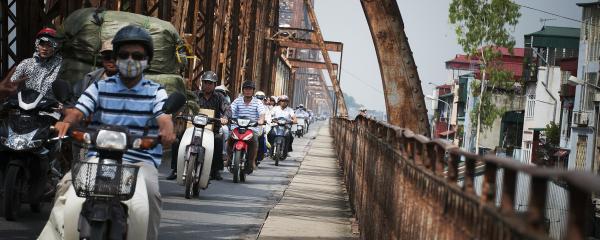Health and well-being

Challenge
Sustainable Development Goal 3 seeks to ensure healthy lives and promote well-being for all ages.
Human health and well-being is threatened by climate change impacts. Extreme heat causes the greatest mortality of all extreme weather hazards, with vulnerable populations most at risk. There were an estimated 490,000 yearly heat-related deaths globally from 2000-2019. And yet heat warnings are provided in only half the world’s countries, according to WMO’s 2023 State of Climate Services for Health report.
Poor air quality and food and water insecurity exacerbate the problem. Air pollution is a major urban threat to health and is associated with nearly seven million premature deaths annually.
Changing climatic conditions also worsen the transmission of many climate-sensitive infectious vector-, food-, and water-borne diseases. For example, dengue is the world’s fastest-spreading vector-borne disease, whilst the length of the malaria transmission season has increased in parts of the world.
Response
Fortunately the climate and health, research and social science communities are working together to meet the challenges and tap the potential for improve global health and well-being.
The World Health Organization (WHO) and WMO promote the co-production and use of integrated climate and health sciences and services to better protect human health from climate change, extreme weather, and other environmental hazards.
Through the Joint Office for Climate and Health, WHO and WMO have developed a climahealth.info portal as a one-stop shop for global knowledge for climate and public health.
The WMO co-sponsored Global Heat-Health Information Network is a forum of scientists, practitioners, and policy makers focused on improving capacity to protect populations from the avoidable health risks of extreme heat
Heat-health early warnings, according by action plans are being embraced by more and more countries – including developing countries such as India and Pakistan with highly exposed populations.
Scaling up investments in climate-resilient and low-carbon health systems, and progress towards universal health coverage are critical for the achievement of SDG 3.
Case studies
WMO’s 2023 State of Climate Services for Health report highlighted a number of case studies:
- Argentina has introduced an early warning system for extreme temperatures to enable the population, health and civil protection organizations to take the appropriate prevention and response measures at each alert level. The weather alerts are issued by the Argentinian National Meteorological Service, and the Ministry of Health issues recommendations for health care. During the warm period from October 2021 to March 2022, 987 daily alerts were issued for extreme heat.
- In Africa, food security and shock response systems support social protection in Mauritania and the Sahel, helping the Mauritanian Government to implement cash transfer programmes in case of floods and bushfires. Humanitarian organizations are improving clean water provision and nutrition through drought anticipation measures in Kenya.
- In Europe, a mobile app has been developed to provide monitoring and alerts of allergenic pollen risk. Real-time observations of aeroallergens are revolutionizing the information available to users of the app – and improving the health of millions of European allergy patients.
- In the Pacific, enhanced integrated risk monitoring and climate-informed early warning systems have helped reduce morbidity and mortality from climate-sensitive diseases In Fiji. Australia played a leading role in the development of a Sun-Smart App to protect people against harmful UV levels.
- In Southeast Asia, satellites support the integration of climate and environmental information into health surveillance systems for Myanmar, and the development of an integrated early warning system for dengue in Viet Nam and measures to enhance the resilience of the most vulnerable settlements in Lao PDR.




